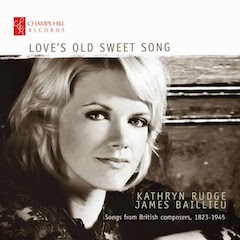
James Baillieu and Kathryn Rudge: treating each song with the same care and sense of seriousness

LOVE’S OLD SWEET SONG
Kathryn Rudge and James Baillieu
Champs Hill Records
This debut disc, on the Champs Hill Records label, from mezzo-soprano Kathryn Rudge, accompanied by James Baillieu, is a selection of English songs from the first 50 years of the 20th century (with the exception of Britten’s arrangement of “The Salley Gardens”). Where Rudge and Baillieu’s selection differs from most other recitals on CD is that they have cast their net across a wide variety of composers so that songs by Edward Elgar, Ivor Gurney and Frank Bridge sit alongside those by Roger Quilter, William Denis Browne, Eric Coates, James Lynam Molloy, Ivor Novello and Haydn Wood. (Many tunes from the later years reflect their British composers’ unsettling experiences in World War I; some of the songwriters actually served in WWI, in fact, notably William Denis Brown, one of the talents cut short by the War, represented by “To Gratiana Dancing and Singing,” and Ivor Gurney, with two haunting tunes from the front lines, “Severn Meadows” [“And who loves joy as he/That dwells in shadows?/Do not forget me quite/O Severn Meadows”] and “By a Bierside.”) You may not immediately recognize all the names in that list, but will with recognize the songs, which include “Love’s Old Sweet Song” and “Roses of Picardy.”
Kathryn Rudge accompanied by James Baillieu on ‘To Gratiana Dancing & Singing,’ by William Dennis Brown, who was killed in WWI. Featured on Ms. Rudge’s debut CD, Love’s Old Sweet Song.
A number of the songs on the disc come into the category of light music though this distinction was less well defined during the first part of the 20th century. What the songs have in common is that they are all well crafted. Ivor Novello’s songs, for instance, have seen something of a revival in recent years owing to this very craftsmanship. It is a fascinating experience to listen to the whole program with the music of Ivor Gurney, Eric Coates, Roger Quilter, Haydn Wood and Ivor Novello side by side. What becomes immediately apparent are the commonalities. Yes, the melodies in some items are more popular sounding and the structure of the songs can be less sophisticated. But all the songs have a similar use of melody as the essential building block.
Roger Quilter’s “Seven Elizabethan Lyrics” were new to me. They were written for the tenor Gervase Elwes, who premiered them in 1908. The cycle sets lyrics from the Elizabethan period and very much occupies the middle ground between Bridge and Gurney on one hand, and Ivor Novello and Haydn Wood on the other.
Kathryn Rudge accompanied by James Baillieu on Ivor Gurney’s ‘By a Bierside.’ Gurney composed the song in August 1916, while the Gloucester regiment was in reserve between periods of front line duty opposite the Germans in Aubers, and finished it ‘in two sittings, almost without effort.’ Featured on Ms. Rudge’s debut CD, Love’s Old Sweet Song.
Kathryn Rudge accompanied by James Baillieu on Ivor Gurney’s ‘Severn Meadows.’ Featured on Ms. Rudge’s debut CD, Love’s Old Sweet Song.
Another major tenor of the period, Steuart Wilson, was involved in the first performance of Browne’s “To Gratiana Dancing and Singing.” In addition to the composers being linked by their service in WWI, another of the album’s interesting links is that the author of the texts to Haydn Wood’s “Bird Song at Eventide” and “Brown Bird Singing” is Rodney Richard Bennett, father of the composer Richard Rodney Bennett.
I first heard Haydn Wood’s “Brown Bird Singing” sung by the great Wagnerian soprano Rita Hunter in a concert that also included the recognition scene from Richard Strauss’s Elektra. This highlights another aspect of Rudge and Baillieu’s program, the continuation of late flowering lyricism in new music used in recitals during the 20th century by singers needing songs suiting their voices. Frank Bridge’s “Love Went A-riding” (the third of his Mary Coleridge Settings) features on Christine Brewer’s disc Echoes of Nightingales, which explores the more popular songs (final set and encore items) used in recitals by great Wagnerian sopranos.
‘The Last Rose of Summer,’ Kathryn Rudge accompanied by James Baillieu on her debut CD, Love’s Old Sweet Song. Originally a poem written in 1805 by Irish poet Thomas Moore (a friend of Byron and Shelley), it was set to a traditional tune titled ‘Aislean an Oigfear’ or ‘The Young Man’s Dream’ and published in an 1813 collection of Moore’s work. Benjamin Britten composed an arrangement for it that he recorded with tenor Peter Pears in 1961.
‘Love’s Old Sweet Song,’ the title track from Kathryn Rudge’s debut CD with James Balllieu (piano). Lyrics by G. Clifton Bingham, written in 1884. The son of a Bristol bookseller, Bingham wrote stories, children’s books and some 1,650 song lyrics. James Lynam Molloy set Bingham’s lyrics to music. This is one of the most frequently referred to and significant musical allusions throughout James Joyce’s Ulysses. Molly Bloom will be singing this song on her concert tour with Blazes Boylan and, indeed, the afternoon liaison between her and Blazes is ostensibly for the purpose of rehearsing the music for that concert, including this song. Bloom learns that the song will be included in the concert tour early in the morning, and it serves throughout his day and the novel Ulysses both as a leitmotif of Molly’s adultery and as the theme song of her potential reconciliation with Bloom.
There is an aspect of English music that lived in a time-warp, ignoring the developments of European music. Frank Bridge was one of the few composers influenced by the European mainstream. His Mary Coleridge Settings date from the years 1914-1917, a period when he became disillusioned with the events of the war (he was a pacifist). It was only after this that his style changed radically to reflect the influence of European modernism.
The disc would not work if the performances were not so fine. Kathryn Rudge has a lovely warm yet focused mezzo-soprano voice that she deploys with a combination of line and superb diction. She is well supported by James Baillieu in treating each song with the same care and sense of seriousness. In many ways this is quite a daring disc. I can think of few programs that combine music by Ivor Gurney, Frank Bridge, Ivor Novello and Haydn Wood. Highly recommended.
![]()
Posted at Planet Hugill—A World of Classical Music on February 28, 2015 and reprinted by permission of the author. Visit Planet Hugill for classical music news, reviews, interviews and musings from contemporary music by composer Robert Hugill.


